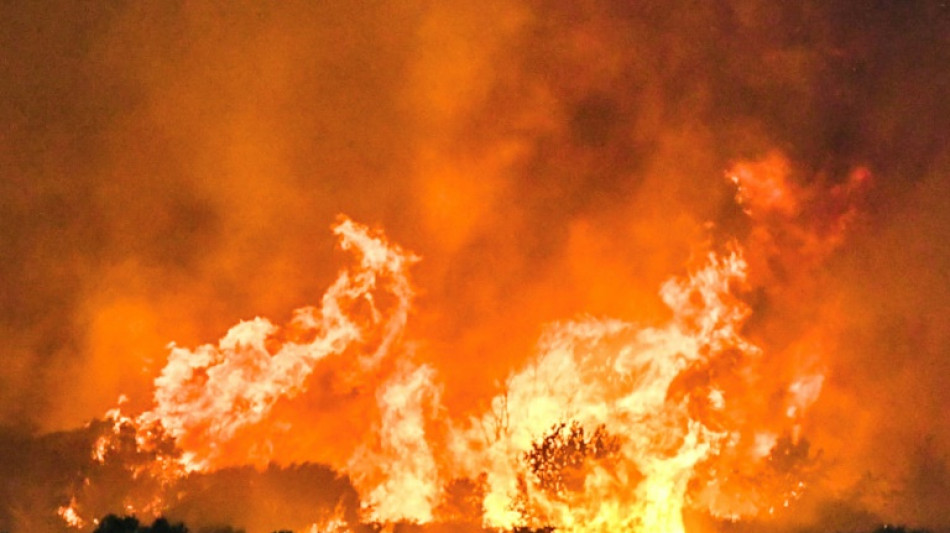

Thousands battle Greece fires as heatwave bakes Europe
Greece on Wednesday battled to contain more than 20 wildfires including one menacing its third-largest city Patras as a heatwave stoked blazes and forced the evacuation of thousands in southern Europe.
Spain, Portugal, France, Italy, the Balkans and Britain have this week wilted in high temperatures that fuel wildfires and which scientists say human-induced climate change is intensifying.
Since dawn on Wednesday, 4,850 firefighters and 33 planes were mobilised across Greece on what promised to be "a very difficult day", fire service spokesman Vassilis Vathrakogiannis said.
A fire near the ancient Mycenaean archaeological site of Voudeni, just seven kilometres (four miles) from Patras, threatened forested zones and homes, and the area was covered by a thick cloud of smoke, an AFP journalist reported.
Fierce wind "is hampering the task of water bombers, and is making collecting water at sea more difficult", the president of the firefighter officers' union, Kostas Tsigkas, told public broadcaster ERT.
In the western Achaia region in the Peloponnese, to which the coastal city of Patras belongs, around 20 villages were evacuated on Tuesday.
Other fronts were burning on the popular tourist island of Zante and the Aegean island of Chios, scarred by a huge wildfire in June that ravaged more than 4,000 hectares.
The Greek coastguard said it had helped evacuate nearly 80 people from Chios and near Patras.
The national ambulance service reported 52 hospitalisations from Achaia, Chios and the western town of Preveza, including "a small number of firefighters", mostly for respiratory problems and minor burns.
Temperatures are due to come close to 40C in parts of western Greece on Wednesday, including the northwest Peloponnese, national weather service EMY forecast.
After Greece requested four water bombers from the EU Civil Protection Mechanism to bolster its resources, leftist opposition party Syriza criticised the conservative government's preparation for the fires that hit every year.
Greece needed "a bold redistribution of resources in favour of civil protection", an "emphasis on prevention", better coordination and new technologies in its civil protection system, Syriza said.
- 'Worst breeding ground' -
At the other end of the Mediterranean, wildfires continued to dominate the news in Spain, where cooler temperatures and greater humidity were expected to help control blazes in which two people have died.
Authorities in the northwestern region of Castile and Leon, where flames have threatened a world heritage Roman mining site, said almost 6,000 people from 26 localities had been evacuated from their homes.
Bushy undergrowth and searing temperatures that have baked Spain for almost two weeks had created "the worst possible breeding ground for this situation", Castile and Leon's civil protection head Irene Cortes said.
A total of 199 wildfires have scorched nearly 98,784 hectares across Spain this year, more than double the area burned during the same period in 2024.
Neighbouring Portugal deployed more than 1,800 firefighters and around 20 aircraft against five major blazes, with efforts focused on a blaze in the central municipality of Trancoso that has raged since Saturday.
Strong gusts of wind had rekindled flames overnight and threatened nearby villages, where television images showed locals volunteering to help the firefighters under a thick cloud of smoke.
"It's scary... but we are always ready to help each other," a mask-wearing farmer told Sic Noticias television, holding a spade in his hand.
Italian firefighters had extinguished a blaze that burned for five days on the famed Mount Vesuvius and spewed plumes of smoke over the Naples area.
In Britain, temperatures were expected to peak at 34C in the country's fourth heatwave of the summer.
The UK Health Security Agency warned of "significant impacts" on health and social care services for the parts of central and southeastern England where the harshest heat was forecast.
burs-imm/jph/giv
Ch.Kainz--NWT



